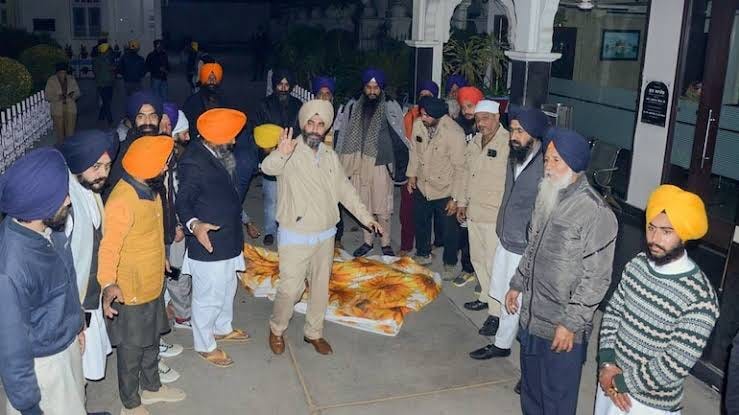Amaan Bali: Khalsa's Justice Rooted In State Failure To Respond To Sacrilege Cases
This incident comes after long-simmering community anger with, and disappointment from, government inaction to past sacrilege cases
Amaan Bali
December 19, 2021 | 3.5 min. read | Opinion
A man was beaten to death Saturday in Amritsar after he attempted beadbi, or sacrilege, in the main sanctum of Darbar Sahib during the evening prayers of Rehraas Sahib.
While some Indian national news outlets attempted to claim it was an alleged incident, the man, who is yet to be identified, can be seen jumping over the gold railings in CCTV footage that SGPC released shortly after the incident.
He picked up a sword and attempted to attack the Garanthi Singh as well as others sitting around the Sri Guru Granth Sahib. The shocking incident was relayed to the entire world because of live coverage of the prayers via PTC.
The man was quickly challenged and beaten by Sikhs.
As per reports, the man was first questioned in a room inside the Darbar Sahib complex, and then taken on a wheelchair to the SGPC headquarters. Meanwhile, police also attended the scene.
SGPC would eventually place the body of a man outside Teja Singh Samundri Hall after uproar from Sikh Jathebandis. Many started questioning whether the SGPC had secretly handed the man to the police. The body of the man and statements from Sikhs who witnessed the beatings he received made it clear that the man had succumbed to injuries after being beaten exiting Darbar Sahib.
The reactions to the sacrilege started coming immediately after the incident.
SGPC’s newly elected president, Harjinder Singh Dhami, confirmed that the young man succumbed to injuries.
Jathedar Akal Takht Sahib Giani Harpreet Singh strongly condemned the sacrilege.
“History tells us that the Sikhs never tolerated any kind of attack on Sri Harmandir Sahib, even when powerful foreign invaders did so. They always gave them a befitting reply. There are some agencies which are behind these incidents in the season of elections.”
This incident comes after long-simmering community anger with, and disappointment from, government inaction to past sacrilege cases.
Just a few days ago, on December 15, a man was handed over to Amritsar Police for committing sacrilege by tearing apart Nitnem Gutka and throwing them in the Sarovar of Darbar Sahib. The SGPC task force made sure that the man was handed to police unhurt expecting justice. Many Sikhs have felt that the police were not taking the case seriously, until yesterday that is.
Akal Takht Sahib Jathedar Giani Harpreet Singh had convened a meeting of Sikh Jathebandis back on July 26, 2021, to discuss growing sacrilege incidents.
The conference arrived at the conclusion that there have been over 250 incidents of sacrilege in Punjab. Most of these incidents were isolated and the culprits were handed over to the authorities.
However, the conference expressed disappointment that no one has been punished for those sacrilege incidents. In some cases, culprits came out without any strict punishment by claiming mental instability. A move many Sikhs see as a loophole in the judicial system.
The 2015 sacrilege in Bargari is still fresh in the minds of Sikhs as well. The ruling Congress government’s promise to deliver justice for Sikhs when it came to power in 2017 remains unfulfilled as the state nears elections in early 2022.
Sacrilege is a sensitive issue for Sikhs across the globe and as such politics for gains on the issue of sacrilege has rendered most political parties irrelevant in Sikh and Panthic spaces.
The firing incident at Bargari which led to the martyrdom of two Sikhs has further lowered the credibility of the judicial system of India in the eyes of Sikhs and its ability to deliver justice in sacrilege cases.
In a more recent example of judicial failure, the state has been unable to trace Dera Sacha Sauda’s Gurmeet’s role in sacrilege incidents.
To most Sikhs, the government just does not understand the gravity of sacrilege in Sikhi.
The history of sacrilege in Punjab is old, one factor that has remained constant in modern times has been the state’s inaction to do something about it.
In 1986, Sikhs protesting against the sacrilege of the Sri Guru Granth Sahib were fired upon by police. 35 years later the Indian courts have arrived at the conclusion that the firing was not necessary because Sikhs were not a mob, and were just entering a Gurdwara. However, the state has failed to connect the dots and punish those guilty of killing demonstrators.
The attempt to commit beadbi recently at Singhu by Lakhwinder was an important tipping point. The threshold for Sikh patience has finally been breached. All political leaders, from Prakash Singh Badal to current Chief Minister Charanjit Channi, understand the plummeting trust amongst Sikhs towards the state when it comes to expecting justice.
A meeting at the Akal Takht of all Jathedars has been called for December 25, 2021, to discuss how to respond to the growing sacrilege issue. The Akal Takht has also urged Sikhs to be extra vigilant during this election season as incidents are more likely to increase.
The SGPC President in a statement hinted at the need for legal amendments when it comes to dealing with sacrilege. For Sikhs, those changes must understand sacrilege from a Sikh perspective.
Amaan Bali is born and raised in Kashmir. He is an entrepreneur and author of the upcoming book, “Growing up on the right side of Kashmir History”. You can find him on Twitter at @amaanbali.
Baaz is home to opinions, ideas, and original reporting for the Sikh and Punjabi diaspora. Support us by subscribing. Find us on Twitter, Instagram, and Facebook at @BaazNewsOrg. If you would like to submit a written piece for consideration please email us at editor@baaznews.org.



